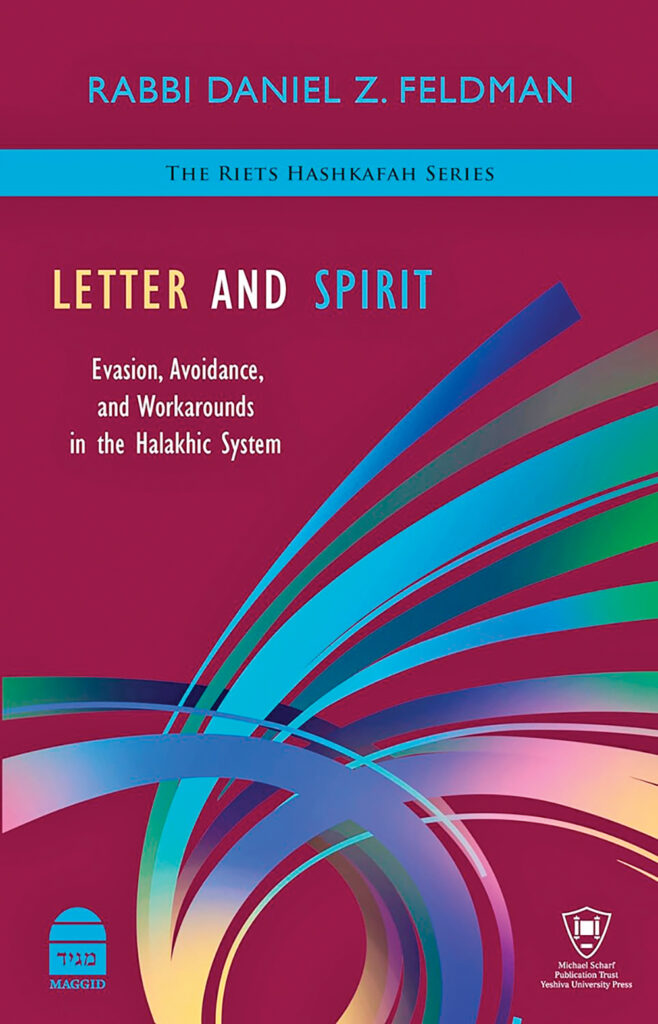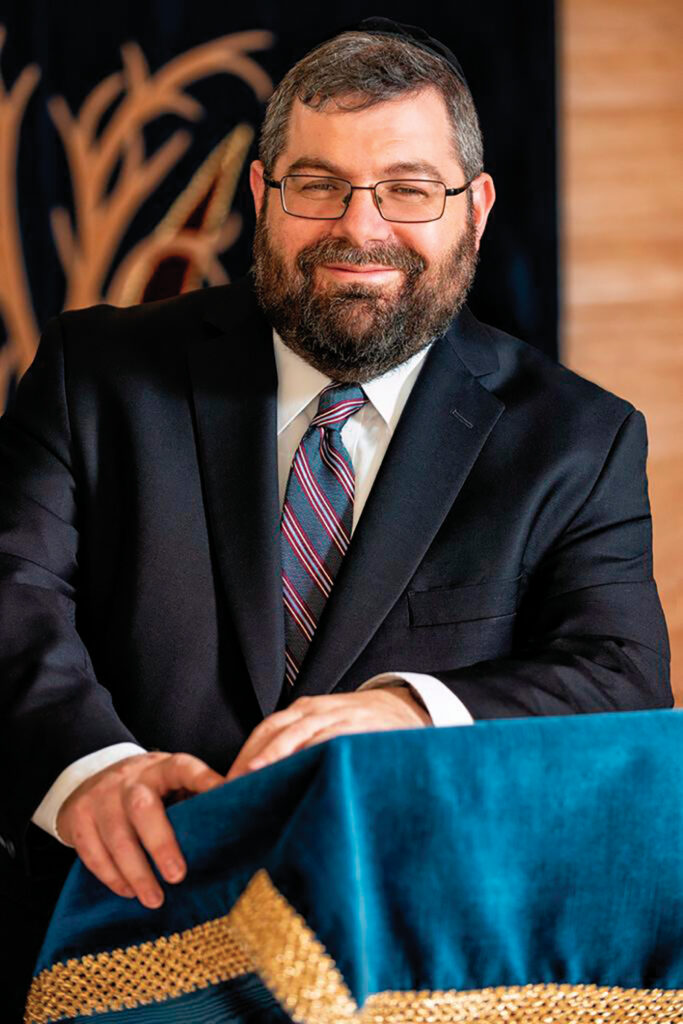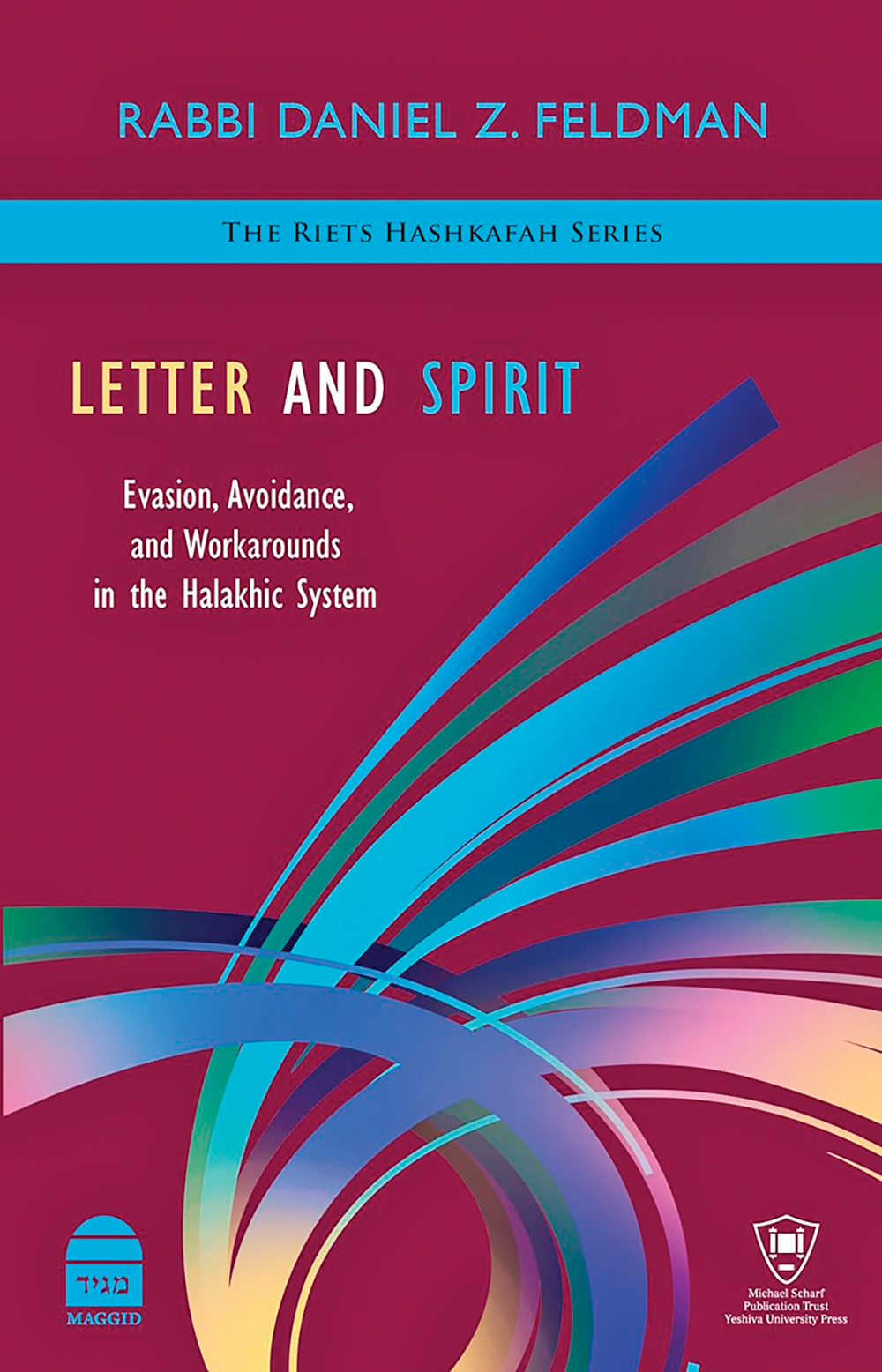
Highlighting: “Letter and Spirit: Evasion, Avoidance and Workarounds in the Halakhic System” by Rabbi Daniel Feldman. Maggid Books. 2024. Hardcover. 352 pages. ISBN-13: 978-1592646500.
Following up his third volume “False Facts and True Rumors: Lashon Hara in Contemporary Culture” (2015), Rabbi Daniel Feldman, executive editor of RIETS Press and rabbi of Congregation Ohr Saadya of Teaneck, has once again taken upon himself the challenge of elucidating a topic which has spurred heated debate over many centuries. In his 2024 publication
“Letter and Spirit: Evasion, Avoidance and Workarounds in the Halakhic System,” Rabbi Feldman discusses practices that very often have been dismissed as “loopholes” used to circumvent halacha. In this erudite work, Rabbi Feldman explores the history and reasoning behind these halachic decisions, citing the opinions of gedolim from different eras and their considerations based on their surroundings.
In his introductory acknowledgements, Rabbi Feldman shares: “If there is a cause associated with this work, it is that of sincerity in practice, the unity of letter and spirit, and the elimination of cynicism, which inflicts so much harm on religious expression. Along the way, there is testament to rabbinic responsibility throughout the generations, the careful considerations of leadership in seeking to maximize religious fulfillment while maintaining awareness of the limitations present upon the people.”
In dedicating this newest volume to his parents, to the memory of his revered father, Rabbi Dr. David Feldman z”l whose ninth yahrzeit was marked recently, and to his beloved mother, tibadel l’chaim, Rebbetzin Aviva Feldman, Rabbi Feldman is paying tribute to their exemplary rabbinic ministering to their various congregations. “My parents, over the course of many decades of joint efforts in the rabbinate, sought to uplift and inspire the population while also recognizing the need of meeting the individual ‘b’asher hu sham’ (Gen. 27:17), where he or she is at the moment, while also envisioning what could be. With warmth, compassion, sensitivity and wisdom, they sought to assist both in the realization of potential and the discovery of new potential… It is this recognition of the vital significance of sincerity and continuing spiritual aspiration, and the corrosive effects of cynicism and dispassion, that is the animating force of this work.”

In the chapter discussing “The Prohibition of Interest and Hetter Iska,” Rabbi Feldman shares a fascinating insight into how economic shifts over the course of generations changed the backdrop against which loans were provided. During the early centuries when loans were primarily provided to support the indigent, the charging of interest was obviously prohibited. As the economy expanded and shifted to capitalism, the prohibition of charging interest on a loan was re-considered in light of the purpose of the loan. If the loan was to be utilized as an investment which would hopefully result in a return to the investor, then it would be considered to be in a category separate from loans to the poor to get them on their feet. Rabbi Feldman cites fascinating literature from different periods during which the Rabbis were concerned about creating a balance between lending to the poor and business opportunities.
In the chapter dealing with “Prozbol and the Remission of Loans,” Rabbi Feldman discusses the sometimes unintended consequences of the Prozbol injunction which discouraged people from providing loans to their neighbors lest they not be returned once the year of Shemita arrived and eliminated the need to return the loans. The rabbis of the different periods had to reach a balance of practice so that the serious commandment of Shemita would continuously be observed.
In a fascinating discussion of “The Sale of Chametz,” Rabbi Feldman discusses the challenges faced in previous generations resulting from the procedures used in selling the community’s chametz before Pesach. In some cases, unscrupulous Jews “swooped in” immediately after Pesach to purchase the chametz sold to the non-Jew at a cheaper price, thus causing a great loss to the original seller. In some communities, individual Jews sold to individual non-Jews which often proved to be a risky process.
Even more controversial than the sale of chametz is the issue of “Shemita and the Heter Mekhirah.” Every seven years, the issue arises to face different circumstances and considerations. The Rabbis are challenged to preserve the laws of Shemita while protecting the economic survival of the country. Even though Israel is currently a thriving economic nation, the differing levels of observance by the farming community necessitates different approaches to letting the land lay fallow for an entire year. Once again, the rabbis are faced with the daunting task of finding a balance in the observance of this crucial mitzvah.
“The Torah’s Commandment of Inheritance and Contemporary Practice” can often raise sensitive and complicated situations for today’s rabbinate in adjudicating inheritance issues. Once again, avoiding familial strife should be the paramount value in dealing with the process, a value very much upheld by Rabbi Feldman’s parents in their rabbinic service.
In “Siyumim: Celebrating the Torah at times of Restrictions,” Rabbi Feldman explores the seeming contradiction between hosting a festive siyum involving abundant eating and drinking during periods of mourning for the Jewish people such as the Nine Days. Does the unity of the people and the celebration of the learning of Torah dwarf the abstention from meat and wine?
Rabbi Feldman devotes his final chapter to the vexing contemporary issue of “The Plight of the Agunah” and the “Halakhic Pre-Nuptial Agreements.” Through a thorough examination of the issues involved, Rabbi Feldman offers thoughtful considerations through the lens of Torah though still short of final re.
Commenting upon this latest work, Rabbi Aharon Lopiansky, rosh hayeshiva of the Yeshiva of Greater Washington, expressed, “Rabbi Feldman has the rare gift of making complex halachic material accessible to the intelligent layman, without sacrificing precision and fidelity to the halacha. It speaks of deep erudition, unwavering commitment, and a gift of exposition and articulation. May he continue to use his pen to enlighten us further.”













